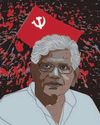As a boy, Karnan was disciplined, would invoke Ambedkar and was strict about the rules

Dogs and cows roam the narrow road leading to Karnatham village in Cuddalore district of Tamil Nadu. The hamlet is dotted with thatched huts, half-constructed buildings and thorny shrubs, and is generally devoid of activity. A few lungi-clad men sit chatting under a withered banyan tree, waiting for the government liquor shop to open. Thin, dark women walk by swiftly, with firewood on the heads. This is the village that birthed Justice C.S. Karnan, the judge who judged the judiciary.
When we ask for Justice Karnan’s house, the men and women give us a sly smile, before pointing to a bust of B.R. Ambedkar and the small, muddy lane opposite to it. Near the bust is a grave, of Justice Karnan’s father, Chinnaswamy Swaminathan, who won the president’s award for excellence in teaching. Near the grave is the entrance to a 15-acre farm and a well-built farmhouse.
A half-naked old man with sore eyes sits in a one-room building next to the farmhouse. “This is Karnan’s house. They are five brothers. He is my nephew. They are hardworking. They were raised here, but none of them come here to take care of me,” says the old man, Chinnaswamy Kasilingam. He recalls the old days when his brother Swaminathan and his children would work on the farm together.
Karnan, born on June 12, 1955 as Karunanithi Swaminathan, went to primary school a few hundred metres from his childhood house, which is about 700 metres from the farmhouse. He was among 13 children in the village to go to the government high school in Mangalampet. He would walk three kilometres every day to reach school. “He was the only dalit among the 13 in that batch to have cleared SSLC with first class. He was always good and sincere at studies,” says his brother, S. Arivudainambi, a lawyer at a Virudhachalam court.
This story is from the {{IssueName}} edition of {{MagazineName}}.
Start your 7-day Magzter GOLD free trial to access thousands of curated premium stories, and 9,000+ magazines and newspapers.
Already a subscriber ? Sign In
This story is from the {{IssueName}} edition of {{MagazineName}}.
Start your 7-day Magzter GOLD free trial to access thousands of curated premium stories, and 9,000+ magazines and newspapers.
Already a subscriber? Sign In

Themes Of Choice
As Savvy Investors Seek New Avenues, Thematic Mutual Funds Are Gaining Popularity

A golden girl
One of India's most formidable beauties passed away earlier this month. The odd thing is she would absolutely hate this obituary; she hated being written about and avoided publicity for all of her nine decades. Indira Aswani was 93 when she died. But anyone who encountered her, even briefly, was in such awe of her grace and poise, and one could not but remember her forever.

The interest in wine is growing delightfully in India
The renowned British wine writer and television presenter Jancis Robinson, 74, recently came to Delhi and Mumbai to reacquaint herself with India's wine industry. This was the Robinson's fourth visit to India; the last one was seven years ago. On this trip, Robinson and her husband, restaurateur Nicholas Lander, were hosted by the Taj Hotels and Sonal Holland, India's only Master of Wine.

United in the states
Indian-Americans coming together under the Democratic umbrella could get Harris over the line in key battlegrounds

COVER DRIVE
Usage-driven motor insurance policies offer several benefits

GDP as the only measure of progress is illogical
Dasho Karma Ura, one of the world's leading happiness experts, has guided Bhutan's unique gross national happiness (GNH) project. He uses empirical data to show that money cannot buy happiness in all circumstances, rather it is family and health that have the strongest positive effect on happiness. Excerpts from an interview:

India is not a controlling big brother
Prime Minister Tshering Tobgay considers India a benevolent elder sibling as the \"big brotherly attitude\" is happily missing from bilateral ties. He thinks the relationship shared by the two countries has become a model of friendship not just for the region, but for the entire world. \"India's attitude is definitely not of a big brother who is controlling and does not allow the little brother to blossom and grow,\" says Tobgay in an exclusive interview with THE WEEK.

Comrade with no foes
Lal Salaam, Comrade Yechury-you were quite a guy!

Pinning down saffron
In her first political bout, Vinesh Phogat rides on the anti-BJP sentiment across Haryana

MAKE IN MANIPUR
Home-made rockets and weapons from across the border are escalating the conflict